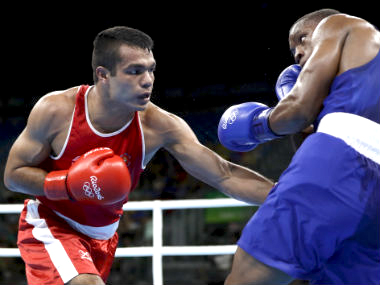Rio de Janeiro, Aug 10: Archer Atanu Das and boxer Vikas Krishan entered the pre-quarterfinals, while the men's hockey team stood up to the challenge posed by Argentina to virtually sew up a last-eight spot on a reasonably successful day for Indian athletes in the Rio Olympics 2016 on Tuesday.
 Das first defeated Nepalese rival Jitbahadur Muktan 6-0 and then vanquished Cuba's Adrian Andres Puentes Perez 6-4 to enter the pre-quarters where he will face a tough rival in former world No 5 South Korean archer Lee Seung-Yun on 12 August.
Das first defeated Nepalese rival Jitbahadur Muktan 6-0 and then vanquished Cuba's Adrian Andres Puentes Perez 6-4 to enter the pre-quarters where he will face a tough rival in former world No 5 South Korean archer Lee Seung-Yun on 12 August.
Lee was a part of the victorious South Korean outfit that won a gold medal in the team Recurve event at the ongoing Games.
What was impressive about Das was the manner in which he held his nerve during his last shot in the fifth and final set.
The score was 19-18 and a '10-pointer' would have ensured his place in the last-16 even before his opponent had aimed for his final strike.
Das did not disappoint as he hit the 'Bull's Eye' taking an unassailable lead and winning the final set 29-28.
The Kolkata-based Das defeated his Cuban rival 28-26 29-26 26-27 27-28 29-28.
Earlier in the day, he made short work of Muktan in three straight games with a comprehensive scoreline of 29-26 29-24 30-26, enjoying a fair lead in all three sets including a hat-trick of Perfect 10's in the final game.
In men's hockey, India survived a final quarter onslaught from Argentina for a nail-biting 2-1 win that enhanced their quarter-final chances.
The second win in the pool stage has virtually secured India a quarterfinal berth as they rose to the second position with six points.
Later in the evening, former Asian Games gold-medallist Vikas Krishan (75kg) gave a perfect start to India's boxing campaign, beating American greenhorn Charles Conwell to enter the pre-quarterfinals.
The 24-year-old Vikas defeated the Olympic debutant 3-0 in his opening contest, which came alive only in the final three minutes, to make the last-16. Vikas will now face Turkey's Onder Sipal, who got the better of Zambian Benny Muziyo in a fiercely-contested opening bout.
On the hockey field, India dominated Argentina in the first three quarters but came under tremendous pressure from the 'Los Leones' in the final 15 minutes during which they conceded as many as five penalty corners.
Trailing 0-2, the Argentines played all out hockey in the final quarter as the Indians looked out of sorts.
It was a tense final quarter for the Indians after drag-flicker Gonzalo Peillat pulled one back for Argentina in the 49th minute by converting their first penalty corner with a lethal strike that beat goalkeeper PR Sreejesh all ends up.
It looked as if it would turn out to be another heartbreak for the Indians, following their 1-2 loss to Germany on Monday after conceding a goal in the dying moments, as the game was mostly played in the Indian half thereafter.
If not for Sreejesh, India could have suffered their second successive defeat in the Games. Sreejesh pulled off as many as five saves to deny Peillat and the Argentines.
Earlier, India were the better side in the first three quarters and took the lead through Chinglensana Singh (8th minute) before fellow Manipuri player Kothajit Singh doubled the scoreline with a field strike in the 35th minute.
However, the country continued to draw a blank medal-wise and faced reversals in the shooting range where Heena Sidhu made her exit after performing poorly in the women's 25m pistol event where she finished a distant 20th with 576 out of 600 points.
India's lone competitor in rowing, Dattu Baban Bhokanal, finished fourth in the quarter-finals of the men's single sculls to go out of medal reckoning.





Comments
Add new comment